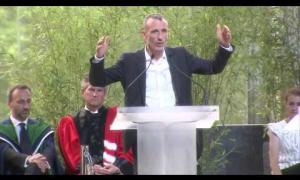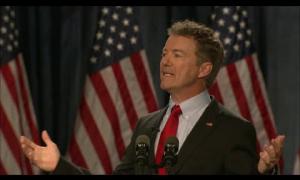Speechwriter as would-be hero
February 25, 2013
David Murray, Editor, Vital Speeches of the Day
Did you know this story? I’m equal parts shocked and embarrassed to say that I did not, until reading Erik Larson’s book about prewar Berlin, In the Garden of Beasts.
So taken by this yarn am I that I’m indulging in making it the Vital Speech of the Week, 79 years later.
In 1934 Hitler’s vice chancellor was Franz von Papen, known for his milquetoast politics—and for being the darling of then President Paul von Hindenburg.
“On Sunday, June 17, Vice-Chancelor Papen was scheduled to deliver a speech in Marburg at the city’s namesake university, a brief rail journey southwest of Berlin,” Larson begins the story which I borrow in a chunk that I pray may be generously considered fair use:
He did not see the text until he was aboard his train, this owing to a quiet conspiracy between his speechwriter, Edgar Jung, and his secretary, Fritz Gunther von Tschirschky and Boegnedorff. Jung was a leading conservative who had become so deeply opposed to the Nazi Party that he briefly considered assassinating Hitler. Until now he had kept his anti-Nazi views out of Papen’s speeches, but he sensed that the growing conflict within the government offered a unique opportunity.
If Papen spoke out against the regime, Jung reasoned, his remarks might at last prompt President Hindenburg and the army to eject the Nazis from power and quash the Storm Troopers, in the interest of restoring order to the nation. Jung had gone over the speech carefully with Tshirschky, but both men had deliberately kept it from Papen until the last moment so that he would have no choice but to deliver it. “The speech took months of preparation,” Tschirschky later said. “It was necessary to find the proper occasion for its delivery, and then everything had to be prepared with the greatest possible care.”
Now, in the train, as Papen read the text for the first time, Tschirschky saw a look of fear cross his face. It is a measure of the altered mood in Germany—the widespread perception that dramatic change might be imminent—that Papen, an unheroic personality, felt he could go ahead and deliver it and still survive. Not that he had much choice. “We more or less forced him to make that speech, Tschirschky said. Copies already had been distributed to foreign correspondents. Even if Papen balked at the last minute, the speech would continue to circulate. Clearly hints of its content had already leaked out, for when Papen arrived at the hall the place hummed with anticipation. His anxiety surely spiked when he saw that a number of seats were occupied by men wearing brown shirts and swastika armbands.
Papen walked to the podium.
“I am told,” he began, “that my share in events in Prussia, and in the formation of the present Government”—an allusion to his role in engineering Hitler’s appointment as chancellor—“has had such an important effect on developments in Germany that I am under an obligation to view them more critically than most people.”
The remarks that followed would have earned any man of lesser stature a trip to the gallows. “The Government,” Papen said, “is well aware of the selfishness, the lack of principle, the insincerity, the unchivalrous behavior, the arrogance which is on the increase under the guise of the German revolution.” If the government hoped to establish “an intimate and friendly relationship with the people,” he warned, “then their intelligence must not be underestimated, their trust must be reciprocated and there must be no continual attempt to browbeat them.”
And so on, until he concluded that the time had come “to silence doctrinaire fanatics.” The audience exploded in a “thunder of applause,” Papen would recall, which drowned out “furious protests” from the uniformed Nazis present.
Historian John Wheeler-Bennett, at the time a Berlin resident, wrote, “It is difficult to describe the joy with which [the speech] was received in Germany. It was as if a load had suddenly been lifted from the German soul. The sense of relief could almost be felt in the air. Papen had put into words what thousands upon thousands of his countrymen had locked up in their hearts for fear of the awful penalties of speech.”
The load would not be lifted long. The speech set off a chain of events that led two weeks later to the infamous Night of Long Knives, in which Papen’s speechwriter, Edgar Jung, was among the murdered.
Papen survived the purge and went on to write his Memoirs, in which he claimed careful authorship of the Marburg speech—“a contention,” Larson adds, “that no one takes seriously. It was as big a surprise to him as it was to his audience.”




